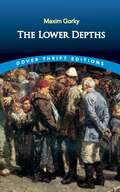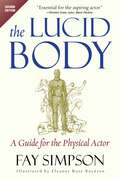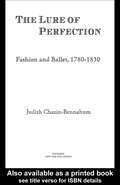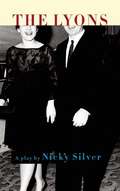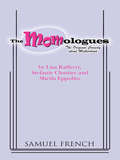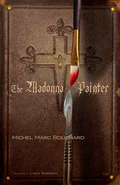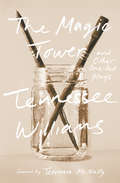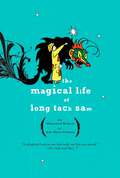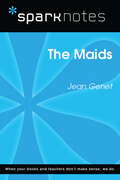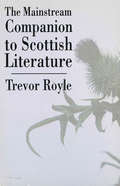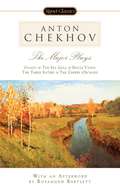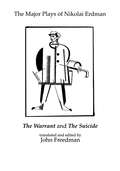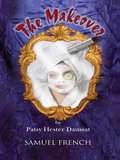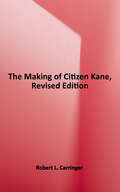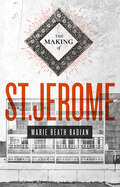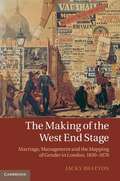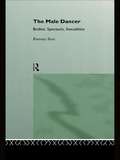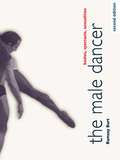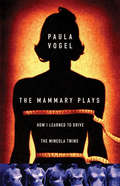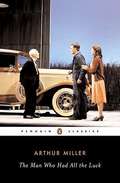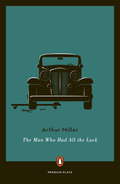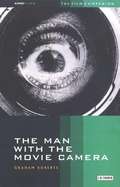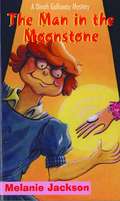- Table View
- List View
The Lower Depths (Dover Thrift Editions)
by Maxim GorkyThe first of Russia's great proletarian writers, Alexey Maximovich Peshkov (1868-1936) adopted the pen name of Gorky, meaning "bitter." Drawing on his own experiences in the lowest social echelon, Gorky portrayed the wretched lives of down-and-outers, instilling his tales with heartfelt protest against a world that both tolerated and fostered the miseries of the underclass.In The Lower Depths, his dramatic masterpiece of 1902, Gorky presents a grimly realistic view of a desperate circle of lost souls. The play unfolds in a derelict boarding house, where a cast of despairing characters argue, play cards, tell stories, and debate the merits of two opposite worldviews: a self-reliant existence free of illusions, or a romanticized outlook that softens the pain of daily life. A revealing look at the atmosphere that led to the 1917 Russian Revolution, the drama abounds in shrewd observations, lifelike characters, and compelling dialog that make it a work of enduring vitality.
The Lucid Body: A Guide for the Physical Actor
by Fay Simpson&“From Fay&’s methodology, I learned to use my intuition and lived experiences in myriad new ways.&” —Winston Duke, actor, Black Panther, Avengers, Us, and Nine DaysEngaging Mind and Body to Develop the Complete Physical Nature of Characters Actors are shape-shifters, requiring the tools to wade into unfamiliar waters and back out again. The Lucid Body offers a holistic, somatic approach to embodying character from the inside-out and, for the non-actor, offers a way to give hidden parts of the self their full expression. By identifying stagnant movement patterns, this process expands one&’s emotional and physical range and enables the creation of characters from all walks of life—however cruel, desolate, or jolly. Rooted in the exploration of the seven chakra energy centers, The Lucid Body reveals how each body holds the possibility of every human condition. Readers will learn how to: Practice a non-judgmental approach to the journey of self-awarenessBreak up stagnant and restrictive patterns of thought and movementAllow an audible exhale to be the key to unlocking the breathDevelop a mindset to &“hear&” one&’s inner bodyAnalyze the human condition through the psycho-physical lens of the chakrasExperience the safety of coming back to a neutral bodyAcquire a sense of clarity and calm in one&’s everyday life A step-by-step program guides the actor through the phases of self-awareness that expand emotional and physical range not only on stage, but also in daily life. This new edition includes a more diversified range of playwrights, non-binary language, and new chapters on stage intimacy protocol and physical listening. Exercises that have been honed for the past ten years have been made more concise. New somatic and neuro-scientific data has been added, with additional wisdom and insights from colleagues and Simpson's team of Lucid Body teachers.
The Lure of Perfection: Fashion and Ballet, 1780-1830
by Judith BennahumTHE LURE OF PERFECTION: FASHION AND BALLET, 1780-1830 offers a unique look at how ballet influenced contemporary fashion and women's body image, and how street fashions in turn were reflected by the costumes worn by ballet dancers. Through years of research, the author has traced the interplay between fashion, social trends, and the development of dance. During the 18th century, women literally took up twice as much space as men; their billowing dresses ballooned out from their figures, sometimes a full 55 inches, to display costly jewelry and fine brocade work; similar costumes appeared on stage. But clothing also limited her movement; it literally disabled them, making the dances themselves little more than tableaux. Movement was further inhibited by high shoes and tight corsets; thus the image of the rigidly straight, long-lined dancer is as much a product of clothing as aesthetics. However, with changing times came new trends. An increased interest in natural movement and the common folk led to less-restrictive clothing. As viewers demanded more virtuosic dancers, women literally danced their way to freedom. THE LURE OF PERFECTION will interest students of dance and cultural history, and women's studies. It is a fascinating, well-researched look at the interplay of fashion, dance, and culture-still very much a part of our world today.
The Lyons
by Nicky Silver"Comedy nirvana . . . satisfyingly mean and funny."-New York Post"Without sacrificing his mordant wit or bleak worldview, this distinctive dramatist shows a new maturity and empathy in."?The New York Times"Nicky Silver's terrific play is filled with moments when you can't stop laughing even though the circumstances indicate you really shouldn't. . . . A wonderful little riff on family dysfunction."?Associated Press"Silver finds plenty of fresh bite, and the sheer savagery of his observation here is breathtaking. Watching it brings the dueling sensations of wicked mirth and squirming discomfort at being trapped in the hell of someone else's family horrors. That these are exaggerations of our own is what gives the play its teeth."-The Hollywood ReporterThis vicious, hilarious black comedy opened on Broadway in April 2012 to rave reviews.Nicky Silver, that "strange progeny of a coupling between Mr. Neil Simon and Edward Albee" (The New York Times), has cornered the market on deliciously savage dysfunctional family comedies. Following an acclaimed run Off-Broadway, this intimate and frightening examination of how we cope with loneliness and disappointment currently delights audiences on Broadway.Rita Lyons is the matriarch of a family facing a major crossroads. Her husband, Ben, is dying and her grown children are struggling. As the family gathers in Ben's hospital room, they discover that they're as terrified of being together as they are of being alone.
The MOMologues
by Sheila Eppolito Stefanie Cloutier Lisa RaffertyComedyCharacters: 4 female. Simple Set. This original comedy about motherhood rips away the gauzy mask of parenthood to reveal what all mothers know but don't always talk about: it's overwhelming and exhausting, but also very, very funny. From the joys of infertility, through reading the same books over and over and over, to finally seeing your baby get on that school bus, this play mines the laughs and tears of the early years of motherhood. Four separate characters tell their individual stories, either directly to the audience in monologues, or in scenes with each other. Mothers everywhere can relate to the labor stories, the frustration of a simple trip to the store, the quest to connect with other mothers, all of which causes them to plan moms' nights out and arrive in packs to laugh hysterically at this tribute to "the toughest job you'll ever love.. "The show is about the ups and downs of motherhood; what binds mothers together, not what sets them apart...edgy, funny, and true." -Showcase Magazine. "At the show we caught Saturday, the audience frequently exploded in laughter." -The Boston Globe. "Reveals the funny, secretive side of having kids!" -Parents & Kids Magazine
The Madonna Painter
by Linda Gaboriau Michel Marc BouchardAt the end of the Great War, to protect his village from the Spanish flu epidemic, a priest commissions an Italian painter to decorate the local church with a fresco dedicated to the Virgin Mary. The painter is to choose, among four local women all named Mary, a model for his work. Superstition collides with desire, and lies are unmasked.
The Magic Tower and Other One-Act Plays
by Terrence Mcnally Tennessee Williams Thomas KeithA wonderful collection of never-before-collected one-acts: "The peak of my virtuosity was in the one- act plays. Some of which are like firecrackers in a rope" (Tennessee Williams). Here are portraits of American life during the Great Depression and after, populated by a hopelessly hopeful chorus girl, a munitions manufacturer ensnared in a love triangle, a rural family that deals "justice" on its children, an overconfident mob dandy, a poor couple who quarrel to vanquish despair, a young "spinster" enthralled by the impulse of rebellion, and, in "The Magic Tower," a passionate artist and his wife whose youth and optimism are not enough to protect their "dream marriage." This new volume gathers some of Williams's most exuberant early work and includes one-acts that he would later expand to powerful full-length dramas: "The Pretty Trap," a cheerful take on The Glass Menagerie, and "Interior: Panic," a stunning precursor to A Streetcar Named Desire. The plays include: * At Liberty * The Magic Tower * Me, Vashya * Curtains for the Gentleman * In Our Profession * Every Twenty Minutes * Honor the Living * The Case of the Crushed Petunias * Moony's Kid Don't Cry * The Dark Room * The Pretty Trap * Interior: Panic * Kingdom of Earth * I Never Get Dressed Till After Dark on Sundays * Some Problems for The Moose Lodge
The Magical Life of Long Tack Sam
by Ann Marie FlemingA full-color graphic memoir inspired by the award-winning documentary-and the life and mystery of China's greatest magician. Who was Long Tack Sam? He was born in 1885. He ran away from Shangdung Province to join the circus. He was an acrobat. A magician. A comic. An impresario. A restaurateur. A theater owner. A world traveler. An East-West ambassador. A mentor to Orson Welles. He was considered the greatest act in the history of vaudeville. In this gorgeous graphic memoir, his great-granddaughter, the artist and filmmaker Ann Marie Fleming, resurrects his fascinating life for the rest of the world. It's an exhilarating testament to a forgotten man. And every picture is true.Watch a QuickTime trailer for this book.
The Maids (SparkNotes Literature Guide Series)
by SparkNotesThe Maids (SparkNotes Literature Guide) by Jean Genet Making the reading experience fun! Created by Harvard students for students everywhere, SparkNotes is a new breed of study guide: smarter, better, faster. Geared to what today's students need to know, SparkNotes provides: *Chapter-by-chapter analysis *Explanations of key themes, motifs, and symbols *A review quiz and essay topicsLively and accessible, these guides are perfect for late-night studying and writing papers
The Mainstream Companion to Scottish Literature
by Trevor RoyleThe Mainstream Companion to Scottish Literature is the most comprehensive reference guide to Scotland's literature, covering a period from the earliest times to the early 1990s. It includes over 600 essays on the lives and works of the principal poets, novelists, dramatists critics and men and women of letters who have written in English, Scots or Gaelic. Thus, as well as such major writers as Robert Henryson, William Dunbar, Gavin Douglas, Allan Ramsay, Robert Fergusson, Robert Burns, Walter Scott, Robert Louis Stevenson and Hugh MacDiarmid, the Companion also lists many minor writers whose work might otherwise have been overlooked in any survey of Scottish literature.Also included here are entries on the lives of other more peripheral writers such as historians, philosophers, diarists and divines whose work has made a contribution to Scottish letters.Other essays range over such general subjects as the principal work of major writers, literary movements, historical events, the world of printing and publishing, folklore, journalism, drama and Gaelic. A feature of the book is the inclusion of the bibliography of each writer and reference to the major critical works. This comprehensive guide is an essential tool for the serious student of Scottish literature as well as being an ideal guide and companion for the general reader.
The Major Plays
by Anton Chekhov Rosamund Bartlett Robert BrusteinThe major plays of Anton Checkov which express life through subtle construction, everyday dialogue, and an electrically charged atmosphere.<P> Includes: <P> * Ivanov * The Sea Gull * Uncle Vanya * The Three Sisters * The Cherry Orchard
The Major Plays of Nikolai Erdman: The Warrant And The Suicide
by Nikolai ErdmanFirst Published in 1995. Russian Theatre Archive- Volume 1. Newly translated by John Freedman, Erdmans's first biographer, Nikola Erdman's two classic tragicomedies, 'The Warrant' and 'The Suicide', come to life as brilliant, eccentric and eminently performable works for the theatre as well as fascinating documents of the theatrical boom and social upheaval that took place in Russia in the 1920s. Both plays were written expressly for the great Vsevolod Meyerhold, who declared that Erdman was the heir to the rich Russian comic dramatic tradition established by Nikolai Gogol and Alexander Sukhovo-Kobylin. Meyerhold's staging of The Warrant in 1925 was one of the most innovative and successful. His attempt to stage The Suicide in 1932 eas banned by Stalin. After being exiled to Siberia in 1933, Erdman never again wrote a full-length play. But, in The Warrant and The Suicide, Erdman's themes- the failure of language as a reliable tool of communication, the degeneration of the human element brought on by the onslaught of mass culture, and the extraordinary, if not always heroic, resilience of the individual human being- remain as contemporary and universal as ever.
The Makeover
by Patsy Hester DaussatComedy / 4m, 4f, 1m or f / Interior Set / It's a typical Saturday evening, as Mike and Melanie play games with their best friends, Victor and Paula. They have been neighbors for years, and each have a son home from college for the summer. Little does Melanie know that her happy, comfortable world will soon be thrown into turmoil. Mike has sent a letter to Facing Facts, Melanie and Paula's favorite reality television show. He believes Melanie, who has gained weight over the years, would be thrilled to have a makeover at Facing Facts' fabulous spa. After all, she and Paula rave about it. Unfortunately, every Monday night when Melanie and Paula watch the show, their husbands leave to play baseball. Poor Mike is clueless about the show's cruel, ratings-hungry hostess, Frances Montgomery, who thrives on humiliating those who are ambushed on the show. When the Facing Facts crew descends at her door, Melanie endures a disastrous ambush. Afterward, she cannot understand why Mike would subject her to national humiliation. Melanie tells him to be out of the house when she returns from the spa. Mike is hopeful that she will change her mind, but things only get worse the evening Melanie returns. Frances not only belittles Melanie again, she sets her sights on an oblivious Mike. Melanie finally explodes, throwing the Facing Facts crew out of her house, along with Mike. Events in the days that follow bring Melanie to realizations about herself and the important things in life.
The Making of Citizen Kane, Revised edition
by Robert L. CarringerCitizen Kane, widely considered the greatest film ever made, continues to fascinate critics and historians as well as filmgoers. While credit for its genius has traditionally been attributed solely to its director, Orson Welles, Carringer's pioneering study documents the shared creative achievements of Welles and his principal collaborators. The Making of Citizen Kane, copiously illustrated with rare photographs and production documents, also provides an in-depth view of the operations of the Hollywood studio system. This new edition includes a revised preface and overview of criticism, an updated chronology of the film's reception history, a reconsideration of the locus of responsibility of Welles's ill-fated The Magnificent Ambersons, and new photographs.
The Making of St. Jerome
by Marie Beath BadianWhen Jason De Jesus discovers his younger brother Jerome was the victim of a senseless shooting, his world is filled with questions surrounding Jerome’s death. Was his brother a threat or a casualty of racial profiling? Was he an innocent bystander or someone other than his family’s shining star? Internalizing his survivor’s guilt while reflecting on their strained relationship, Jason’s quest for truth and justice is tainted as he discovers there are no simple answers.
The Making of the West End Stage: Marriage, Management and the Mapping of Gender in London, 1830-1870
by Jacky BrattonAll roads lead to London - and to the West End theatre. This book presents a new history of the beginnings of the modern world of London entertainment. Putting female-centred, gender-challenging managements and styles at the centre, it redraws the map of performance history in the Victorian capital of the world. Bratton argues for the importance in Victorian culture of venues like the little Strand Theatre and the Gallery of Illustration in Regent Street in the experience of mid-century London, and of plays drawn from the work of Charles Dickens as well as burlesques by the early writers of Punch. Discovering a much more dynamic and often woman-led entertainment industry at the heart of the British Empire, this book seeks a new understanding of the work of women including Eliza Vestris, Mary Ann Keeley and Marie Wilton in creating the template for a magical new theatre of music, feeling and spectacle.
The Male Dancer: Bodies, Spectacle and Sexuality
by Ramsay BurtIn this challenging and lively book, Ramsay Burt examines the representation of masculinity in twentieth century dance. Taking issue with formalist and modernist accounts of dance, which dismiss gender and sexuality as irrelevant, he argues that prejudices against male dancers are rooted in our ideas about the male body and male behaviour. Building upon ideas about the gendered gaze developed by film and feminist theorists, Ramsay Burt provides a provocative theory of spectorship in dance. He uses this to examine the work of choreographers like Nijinsky, Graham, Bausch, while relating their dances to the social, political and artistic contexts in which they were produced. Within these re-readings, he identifies a distinction between institutionalised modernist dance which evokes an essentialist, heroic, `hypermasculinity'; one which is valorised with reference to nature, heterosexuality and religion, and radical, avant garde choreography which challenges and disrupts dominant ways of representing masculinity. The Male Dancer will be essential reading for anyone interested in dance and the cultural construction of gender.
The Male Dancer: Bodies, Spectacle, Sexualities
by Ramsay BurtIn this challenging and lively book, Burt examines the representation of masculinity in twentieth century dance. The Male Dancer has proven to be essential reading for anyone interested in dance and the cultural construction of gender.
The Mammary Plays
by Paula VogelThe Mineola Twins and How I Learned To Drive are mirror-image family plays about coming of age in the '60s. The Mineola Twins, primarily set on Long Island, New York, is the more fiercely comic and political of the two. How I Learned To Drive, set mostly in Maryland, is a more delicate tale of sexual awakening.
The Man Who Had All the Luck
by Arthur MillerThe forgotten classic that launched the career of one of America's greatest playwrights It took more than fifty years for The Man Who Had All the Luck to be appreciated for what it truly is: the first stirrings of a genius that would go on to blossom in such masterpieces as Death of a Salesman and The Crucible. Infused with the moral malaise of the Depression era, the parable-like drama centers on David Beeves, a man whose every obstacle to personal and professional success seems to crumble before him with ease. But his good fortune merely serves to reveal the tragedies of those around him in greater relief, offering what David believes to be evidence of a capricious god or, worse, a godless, arbitrary universe. David’s journey toward fulfillment becomes a nightmare of existential doubts, a desperate grasp for reason in a cosmos seemingly devoid of any, and a struggle that will take him to the brink of madness. This Penguin Classics edition includes an introduction by Christopher Bigsby. .
The Man Who Had All the Luck
by Arthur MillerA new Penguin Plays edition of the forgotten classic that launched the career of one of America's greatest playwrights It took more than fifty years for The Man Who Had All the Luck to be appreciated for what it truly is: the first stirrings of a genius that would go on to blossom in such masterpieces as Death of a Salesman and The Crucible. This striking new edition finally adds Miller's first major play to the Penguin Plays series--now in beautifully redesigned covers. Infused with the moral malaise of the Depression era, this parable-like drama centers on David Beeves, a man before whom every obstacle to personal and professional success seems to crumble with ease. But his good fortune merely serves to reveal the tragedies of those around him in greater relief, offering what David believes to be evidence of a capricious god or, worse, a godless, arbitrary universe. David's journey toward fulfillment becomes a nightmare of existential doubts, a desperate grasp for reason in a cosmos seemingly devoid of any, and a struggle that will take him to the brink of madness.From the Trade Paperback edition.
The Man With the Movie Camera (KINOfiles Film Companions #2)
by Graham Roberts Roberts GrahamThe "KINO Russian Cinema" series has been expanding to provide students and general readers with readable companion handbooks to important and interesting films of Russian cinema from its beginnings to contemporary times. This volume investigates the production, context and reception of the film "The Man with the Movie Camera" directed by Dziya Ventov, the people who made it, and the film itself, including its place in Russian and World cinema.
The Man in the Moonstone (Orca Books)
by Melanie JacksonWhen Dinah gets a part in the musical adaptation of Wilkie Collins' "The Moonstone", she stumbles onto a plot to steal a priceless ring.

